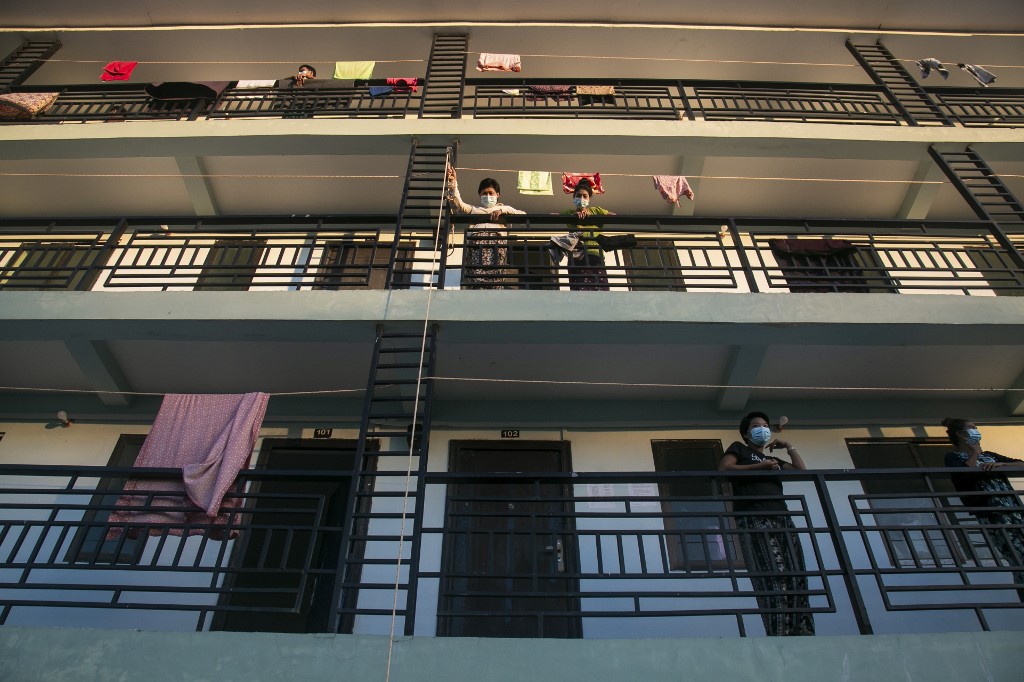
Various Covid-19 restrictions remain in place around Myanmar as some of its cities struggle to confine a second Covid-19 wave. For one transgender woman who travelled from Yangon to Mandalay, quarantine soon turned into an ordeal of discrimination, fear and discomfort.
*Khine, 25, said her district administrator permitted her to isolate at her home for two weeks on the Mandalay-Mogok highway when she left Yangon on November 2.
But when she arrived, neighbours asked the administrator if she could quarantine elsewhere because they feared she would bring the virus to the area. She took a taxi to the government-run Pathein Gyi Quarantine Centre in Mandalay, where staff debated whether to place her in the female dormitory—her preferred choice.
They decided to provide her with a separate bedroom and bathroom. Then on November 3 she and other quarantine residents were transferred to the Arkar Theit Pan building at Mandalarthiri Stadium, which has been converted into a 200-bed quarantine centre.
Again, staff moved her into an isolated space because she was transgender, telling her that they could not place her with either the men or the women.
Myo Min Oo, a volunteer at the stadium, said the Ministry of Health and Sports and local management made the decision to isolate Khine.
“I guess her feelings weren’t accounted for,” he said. “They deemed it inappropriate to place her in the men’s dormitory because she dressed and behaved like a woman.”
He added that the management “might have thought it inappropriate to place her in the women’s dormitory because she has a man’s body.”
Myanmar Mix contacted the Ministry of Health and Sport’s Mandalay office, but a staff member said they were unaware of the issue and were “too busy” to provide the phone number for the Arkar Theit Pan building or for its administrator.
This time Khine’s accommodation was an eerie and secluded empty dormitory where blackouts were regular and the toilets had no running water. She was brought three meals a day, though the food was hard rice and a little meat, she said. She slipped into one of the cubicles, the sole occupant of the large hall for the next 10 days, for the cost of 90,000 kyats.
“I feel very frightened,” she told Myanmar Mix on her seventh day in quarantine. “It feels very unsafe and is affecting my mental stability. Since there are lots of cubicles here, I can’t see around me. I become more and more terrified when it turns dark.”
Khine said the volunteers, including Myo Min Oo, were friendly and helpful. She asked them for more secure accommodation, like the bedroom she had in Pathein Gyi Quarantine Centre, but the general administrator of the stadium denied the request.
“He said ‘you have to stay even if you don’t want to’ although I explained to him that I felt very insecure here,” she said. “He insisted they couldn’t place me anywhere else and were following orders.”
When Khine persisted, she recalled the administrator saying the “only person responsible for feelings of fear is the person experiencing it.”
Khine, who transitioned in 2015, said the administrator “deadnamed” her, or purposely referred to her several times by her former name.
“He was raising his voice and deliberately called me by my deadname repeatedly, even in parts of the conversation where it wasn’t relevant,” she said. “I don’t mind if it was used when he needed to check my official documents, but this was extremely humiliating. I cried all night and didn’t get sleep for three nights because every sound startled me.”
On November 6, all the quarantine residents were tested for Covid-19 except for Khine, who had to wait until November 10 because she was isolated, she said.
In Myanmar, transgender people are not legally allowed to change the gender assigned to them at birth. Members of Myanmar’s queer community face penalties of up to 10 years in prison for having homosexual sex under Section 377 of the country’s penal code. Although rarely enforced, the law gives the authorities an excuse to harass anyone with a non-straight sexual orientation.
Transgender people also face more general discrimation amid the widely held belief that being born LGBT is karmic retribution of sins committed in one’s past life. However, popular figures such as transgender fasion designer Mogok Pauk Pauk and Swe Zin Htet, the first openly gay Miss Universe contestant, as well as recent Pride festivals have boosted the queer community and have helped challenge discrimination.
“I accept that, living in Myanmar, I will have to face discrimination to some extent,” added Khine, who completed her quarantine on November 13.
*Khine’s real name has been changed because she has not yet told her partner’s family that she is transgender.

